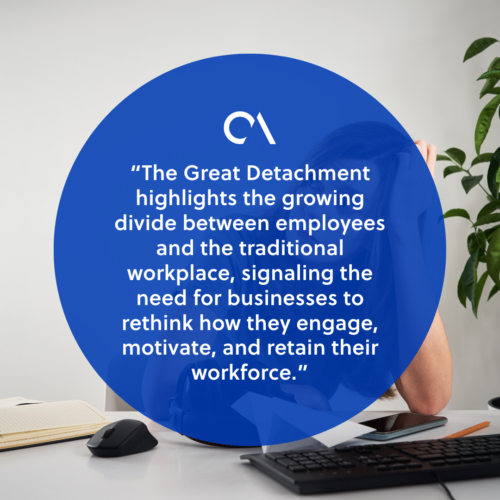The Great Detachment: A shift in the modern workplace

In the face of the seismic shifts brought on by the Great Resignation, a new sensation has emerged in the collective psyche of the workforce – The Great Detachment.
Going to work is no longer merely about clocking in anymore. Recently, there’s been more talk about a profound disconnect between individuals and their jobs.
People are yearning for something more meaningful, and there’s an unshakable feeling of apathy that pervades the workplace.
This article takes a look at the Great Detachment, its implications, and strategies on how to navigate it.
What is The Great Detachment?
“The Great Detachment” refers to a growing trend where employees increasingly disengage from their work. They tend to feel less connected to their jobs, employers, and even the traditional career paths that once defined their professional lives.
This phenomenon is characterized by a shift in workforce dynamics. Individuals now prioritize personal well-being, work-life balance, and meaningful work over traditional markers of job success, such as stability, longevity, and upward mobility.
It’s unlike “The Great Resignation,” which saw masses of people quitting their jobs in search of better opportunities.
The Great Detachment is more about a psychological and emotional separation from work. It reflects a broader cultural and economic shift driven by various factors, including evolving expectations around what a career should offer.
In essence, The Great Detachment highlights the growing divide between employees and the traditional workplace. It signals a need for businesses to rethink how they engage, motivate, and retain their workforce.

7 causes behind The Great Detachment
There are several underlying causes of The Great Detachment that organizations can take proactive steps to address:
1. Burnout
Many individuals have been working tirelessly during the pandemic, often juggling remote work, caregiving responsibilities, and personal challenges.
This prolonged stress and constant pressure have led to burnout and feelings of overwhelm, prompting a disconnection from work.
2. Lack of work-life balance
The blurred boundaries between work and personal life have been exacerbated by remote work arrangements. It’s become challenging for individuals to switch off and recharge.
The imbalance in prioritizing work over personal well-being has fueled feelings of detachment.
3. Unfulfilling work environment
Employees disengage when they feel undervalued, unappreciated, or unchallenged in their roles. The lack of opportunities for growth, creativity, or meaningful contribution can lead to a sense of detachment from the job.
4. Uncertainty and instability
The ongoing economic and job market uncertainties have created a sense of disillusionment among employees. These come coupled with fears of job insecurity and financial instability.
Uncertainty about the future can contribute to detachment from the current job.
5. Mismatched values and company culture
Misalignment between personal values and those upheld by the organization can lead to a sense of ethical or moral detachment from the job.
In many cases, this can be due to a toxic work environment that prioritizes productivity over employee well-being.
6. Psychological impact of the pandemic
The shadows of the COVID-19 pandemic still haunt many workers today.
The mental health toll of the pandemic, including increased anxiety, depression, and feelings of isolation, has significantly impacted individuals’ emotional well-being. These psychological struggles can manifest as detachment from work.
7. Desire for purpose and meaning
The quest for a deeper sense of purpose, meaningful work, and alignment with personal values has become more pronounced among individuals.
Those who find their current job lacking in fulfilling these needs may experience a sense of detachment.
The impact of The Great Detachment on businesses
With their employees being the heart of the company’s work, businesses are not immune to these effects of The Great Detachment:
Decreased employee engagement
The Great Detachment results in reduced employee engagement levels, leading to lower productivity, motivation, and commitment to work.
Disengaged employees are less likely to go above and beyond their role, resulting in a negative impact on overall business performance.
Increased turnover rates
When employees feel detached from their work, they are more likely to seek opportunities elsewhere.
High turnover rates can be a costly issue for businesses, affecting team dynamics, knowledge retention, and overall morale within the organization.
Negative impact on team morale
The presence of detached employees can affect team dynamics and morale.
The lack of engagement and enthusiasm can spread negativity and demotivation among colleagues, creating a toxic work environment that hampers collaboration and innovation.
Loss of innovation and creativity
Detached employees are less likely to contribute new ideas, suggest improvements, or participate in creative problem-solving.
This can hinder innovation within the organization, stifle growth opportunities, and put businesses at a competitive disadvantage.
Decreased profitability and performance:
Overall, The Great Detachment can lead to decreased profitability and performance for businesses.
Disengaged employees are less productive, less committed, and less likely to contribute to the success of the organization, ultimately affecting the bottom line.
How employers can deal with The Great Detachment
By implementing these strategies, employers can work towards mitigating The Great Detachment:
- Prioritize well-being – Encourage time off, set clear boundaries between work and personal time, and provide resources for mental health support.
- Foster open communication – Regular check-ins, feedback sessions, and opportunities for employees to voice their concerns can facilitate a more engaged and connected workforce.
- Provide growth opportunities – Offer a clear path for career advancement and learning to show that their growth is valued.
- Align values and purpose – It’s important for employers to communicate the company’s values and purpose clearly and demonstrate a commitment to these principles.
- Promote flexibility and autonomy – Offering flexible work arrangements can empower employees to better manage their work and personal responsibilities.
- Recognize and reward contributions – Acknowledge and reward employees for their contributions, whether through monetary incentives, recognition programs, or simple expressions of gratitude.
- Address underlying issues – Organizations should proactively address any systemic or organizational issues that may be contributing to detachment. Taking steps to address these root causes can significantly improve employee engagement.

The Great Detachment presents a unique opportunity for employers to redefine their workplace culture and enhance organizational resilience.
Encouraging a mindset that values flexibility and growth not only empowers employees but also drives businesses forward.







 Independent
Independent




